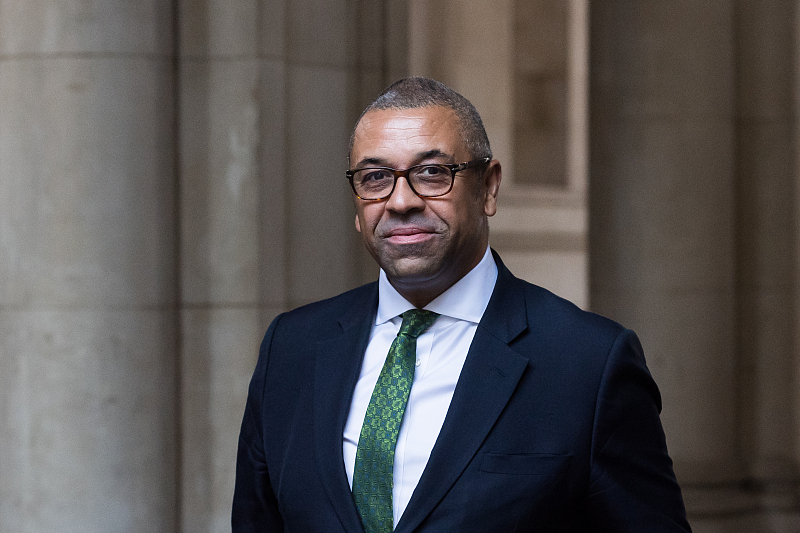
Editor's note: Imran Khalid, a special commentator on current affairs for CGTN, is a freelance columnist on international affairs. The article reflects the author's opinions and not necessarily the views of CGTN.
The visit of British Foreign Secretary James Cleverly to China has seized the world's spotlight for obvious reasons. With the apparent objective of recalibrating a relationship that has witnessed tempestuous tides in recent times, Cleverly's visit carries immense symbolism.
As the highest-ranking emissary from the United Kingdom to visit China in the last five years, Cleverly's sojourn has assumed tangible significance. Beyond its symbolic resonance, the encounter bears the potential to kindle a revival of amity between these two global actors. Beyond mere diplomatic niceties, it harbors the potential to serve as a catalyst for a rapprochement between the UK and China.
At the heart of the China-UK dynamic, there seems to lurk certain predispositions within Britain that hark back to cold-war sensibilities or even a "values-driven bias" against China. Apparently, the Sunak administration is treading a delicate line. Recognizing that mishandling the political discourse with China could reverberate through the UK's economic fabric, there is an imperative to foster engagement at the diplomatic and trade levels.
Concurrently, with the specter of the impending general election, slated by January 2025, the Sunak government finds itself compelled to recalibrate its stance towards China. This entails timely policy adjustments to project an image of measured governance to the British voters. Straddling these dual compulsions, the government's acumen will likely determine the trajectory of this pivotal relationship.
The year 2015 marked a significant chapter in Sino-British relations as Chinese President Xi Jinping visited Britain. The rendezvous, where President Xi met the late Queen Elizabeth II and the then-Prime Minister David Cameron, held promises of an epochal "golden decade" of collaboration. Regrettably, the celestial tones of cooperation that reverberated across that time gradually gave way to a dissonant note, ushering in an era of icy rhetoric and stalled diplomacy.
Nonetheless, within this evolving milieu, a ray of optimism emerges. Foreign Secretary James Cleverly's visit to China holds the potential to reignite the embers of concord. Cleverly's visit signifies an understanding that amicable engagement should eclipse the prospects of hostility. Amidst this intricate terrain, the trajectory of Sino-British interaction could illuminate a path to peace and stability.
Britain's optimal stance lies in assuming the role of an effective interlocutor, an approach that can reverberate the desire to engage with China. At this juncture, mature discourse assumes even greater significance as it holds the potential to mitigate mounting tensions and fluctuations. In an era when the globe teeters on the brink of heightened volatility and escalation of geopolitical tensions, such diplomacy could offer a stabilizing counterbalance to an increasingly uncertain world.

Secretary of State for Foreign, Commonwealth and Development Affairs James Cleverly arrives in Downing Street for the final cabinet meeting in London, United Kingdom, October 25, 2022. /CFP
Secretary of State for Foreign, Commonwealth and Development Affairs James Cleverly arrives in Downing Street for the final cabinet meeting in London, United Kingdom, October 25, 2022. /CFP
Amidst heightened geopolitical tensions, intensified by U.S. pugnacious behaviors, adopting a conciliatory stance assumes huge importance. Engaging in high-level dialogues between Western diplomats and China unveils a crucial avenue for progress. Such diplomatic exchanges serve as a catalyst to advance the overarching objective. These interactions stand as pivotal moments, presenting an opportunity to steer international relations toward a more cooperative and harmonious orbit.
It was perhaps the lowest point in Sino-UK relations, when, at the G7 summit in May, British Prime Minister Rishi Sunak said that China poses the "biggest challenge in the world to global security and prosperity." But, lately, an infusion of pragmatism has become increasingly evident in Sunak's approach to foreign policy concerning China.
In a recent shift, Sunak has demonstrated a heightened pragmatism by dispatching a trade minister and Peter Mandelson, a former Labour trade secretary boasting extensive influential connections, for engagements in China this past summer. Simultaneously, there exists a cluster of urgent global concerns demanding attention. Chief among these is the pressing climate emergency, standing shoulder-to-shoulder with the imperatives of the global economy.
In another recent gesture of pragmatism, the British Foreign Office has taken a step to stop its employees from using the term "hostile state" in reference to China, Russia, the DPRK, and Iran in official government documents and internal communications.
This conciliatory move, however, is encountering resistance from the faction of China skeptics within the UK. The Sunak administration appears vulnerable to external pressures from the United States as well as domestic China hawks. Given this backdrop, Foreign Secretary James Cleverly's visit to China gains significance, likely unfolding as a tentative interaction after the pandemic subsides. Such an exchange would symbolize renewal and underscore the intent to sustain a level of dialogue despite the challenges posed by differing viewpoints.
While the British government, including Cleverly, seems uncertain about the ramifications of engaging with China, such a visit stands as the channel for reigniting China-UK relations. The question looms: Without interaction, can bilateral ties truly regain their former equilibrium? Communication is vital to restoring the bilateral diplomatic ties.
Currently, the political and diplomatic ties between China and the UK are on a temporary pause, reminiscent of a frozen state awaiting the warmth of pragmatic endeavors. This visit stands as a potential harbinger of the initial strides toward revitalizing this relationship. However, the sustenance of this rekindled bilateral rapport will necessitate concrete, subsequent actions to ensure a seamless continuation of this promising resurgence.
(If you want to contribute and have specific expertise, please contact us at opinions@cgtn.com. Follow @thouse_opinions on Twitter to discover the latest commentaries in the CGTN Opinion Section.)